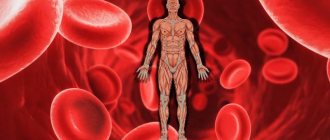Pregnancy is a special period in a woman’s life. Her body begins to work at a different pace, so cases of rapid heartbeat are not uncommon. This phenomenon is called tachycardia. A pregnant woman is said to have palpitations when the heart rate exceeds one hundred beats per minute. Most likely, the heartbeat will return to normal. However, if tachycardia occurs too often and does not go away after the recommended actions, then contact a specialist immediately.
Rapid heartbeat: what is it?
A rapid heartbeat (tachycardia) is said to occur when the frequency of contractions of the arteries of the heart exceeds the norm established for a certain age. The human pulse is one of the most important biomarkers that reflects the picture of general health and level of physical fitness, therefore any changes in heart rate should be monitored over time under the influence of various etiological factors.
The heart is a muscle that, when contracting, ensures the circulation of blood enriched with vitamins, nutrients and oxygen and its transport to all tissues and organs. All work of the heart is subject to the cardiac cycle, which consists of systole (periods of tension) and diastole (periods of relaxation). When the cardiac cycle is disrupted, the heart rhythm changes, arrhythmia occurs, and heart rate slows down or speeds up, which is clinically manifested by a change in pulse value.
Pulmonary artery stenosis (PAS) in newborns is a narrowing of the lumen of the outflow tract of the right ventricle. Pathological changes affect the pulmonary valve or part of the vessel in the valve area. Read more in the article: “pulmonary artery stenosis in newborns.”
Rapid heartbeat can be considered a pathology only if a change in pulse is observed at rest, or tachycardia does not go away for a long period of time, occurs at night (and also if a woman is diagnosed with more than 10 attacks of tachycardia per day).
Visit or doctor's visit: preparatory activities
Poor health, constant low blood pressure and vomiting require preparation before visiting the medical center on your own. You should relax before going to the hospital.
Loved ones need:
- make an appointment for the pregnant woman in advance;
- organize delivery in the most comfortable conditions by car or taxi in the shortest possible time;
- promptly pick up the pregnant woman from the clinic.
If acute problems arise, you should wait until the doctor comes to your home. Ambulance is an effective measure in the fight against toxicosis, since the patient may be unable to move independently.
Causes
The main causes of heart palpitations during pregnancy are physiological changes in a woman’s body. In the early stages, hormonal changes occur against the background of increased secretion of sex hormones, which leads to stimulation of the heart muscle and the development of tachycardia. Gradually, with the growth of the fetus and uterus, the volume of circulating blood increases, and the uteroplacental circulation appears. All this creates additional stress on the heart. In the later stages, when the child is already quite large, a displacement of the organs located next to him occurs.
The position of the heart also changes to some extent, which may affect its functioning. The cause of tachycardia may be other factors, namely:
- development of ectopic pregnancy; excess weight;
- severe stress, anxiety, fears;
- increased metabolic rate, leading to a deficiency of vitamins that are necessary for normal heart function;
- anemia;
- hypertension or hypotension;
- severe form of toxicosis;
- taking medications;
- allergies, bronchial asthma;
- thyroid diseases;
- infections and inflammations;
Physiological reasons
In addition to changes in hormonal levels, the causes of rapid heartbeat in pregnant women may be other factors related to the characteristics of female physiology during a given period. These include:
- a progressive increase in the size of the uterus, which, as the fetus grows, stretches and begins to put pressure on the diaphragm and blood vessels, preventing normal blood circulation (less blood and oxygen enter the heart, as a result of which it is forced to contract more intensely than usual);
- increase in body weight, leading to the occurrence of reflex cardiac reactions;
- vitamin deficiency and deficiency of macro- and microelements necessary for the proper functioning of the heart (most of the nutrients, especially potassium and magnesium, enter the fetus’s body for its growth and development);
- toxicosis;
- iron deficiency anemia (to varying degrees in almost all pregnant women).
Often, moderate tachycardia occurs against the background of allergic reactions, in case of violation of the dosage regimen of medications (including vitamin complexes) and the use of drugs prohibited for use during pregnancy. Natural factors that disrupt normal heart rhythm are stress, strong emotional excitement and physical activity, which in pregnant women increases with each trimester. Rapid heartbeat, if the deviation from the reference value does not exceed 10%, is also the norm for pregnant women, since to provide the fetus with the necessary elements and oxygen, an increase in the volume of circulating blood is required, as a result of which the heart begins to contract more actively.
There are several ways to check for coronavirus at home, but few of them are quite informative. The need for self-diagnosis usually arises when a doctor refuses to write a referral for biomaterial and laboratory testing. Read more in the article: “how to test for coronavirus: diagnostic methods.”
Sudden mood swings.
You woke up in a good mood, but a minute later absolutely everything irritates you? This is not a mental disorder. Until hormonal levels stabilize, constantly changing emotions, a sudden transition from negative to positive, can accompany a woman throughout pregnancy. Explain to your loved ones that now you are more sensitive to everything that happens around you. When your hormonal levels return to normal, you will feel better. This usually happens in the second trimester of pregnancy. If emotional problems bother you too much, be sure to ask your doctor to prescribe you a mild sedative that is not contraindicated for pregnant women.
Features of tachycardia in pregnant women
Advertising:
There are many reasons for frequent heart contractions, so patients with severe discomfort and repeated attacks must undergo examination. Some nuances need to be taken into account:
- In pregnant women in the first trimester, tachycardia occurs due to an increase in circulating blood volume and cardiac output to ensure the necessary blood flow to the fetus.
- Increased production of thyroid and adrenal hormones affects heart rate.
- There is a change in metabolism and a rapid increase in body weight.
- Experiences and stress increase the release of adrenaline, which is manifested by rapid heartbeat.
- Under the influence of progesterone, vascular tone weakens and pressure decreases, compensatory tachycardia occurs.
- As the fetus grows, the diaphragm rises, breathing and heart contractions become faster to deliver the required amount of oxygen.
- Iron deficiency anemia is manifested by dizziness and rapid pulse due to hypoxia.
- A sharp change in position and compression of large vessels by the uterus at a later date lead to sudden weakness and tachycardia, which disappear with a change in body position.
- Some medications affect blood pressure and heart rate. Before taking any medications, you should consult a gynecologist.
- Excessive physical activity worsens the condition.
- Nausea, severe headache and rapid heartbeat during late pregnancy may be signs of toxicosis.
The appearance of acne.
This symptom is also associated with hormonal changes in the body. Acne can appear even in women who have never suffered from it before. Acne during pregnancy usually disappears when hormonal levels stabilize and no longer bothers the woman. You can often miss this phenomenon, mistaking it for a component of premenstrual syndrome, especially if you have previously been treated for acne. Topical, and especially systemic, retinoids can adversely affect fetal development, so you should stop using these medications if there is a delay.
When to sound the alarm?
If a woman feels normal and does not experience discomfort, there is no reason to worry. Such attacks occur from time to time in pregnant women and go away on their own. Unfortunately, attacks of rapid heartbeat are not always so harmless. The reasons for contacting a specialist are:
Advertising:
- increased fatigue;
- annoying headache for 2-3 hours;
- weakness and dizziness;
- sharp pain in the heart area;
- dyspnea;
- state of anxiety and fear;
- nausea and vomiting.
All these symptoms can be caused by other reasons, for example, excessive fatigue and drowsiness in the early stages are associated with an increase in the level of the hormone progesterone. If you are not sure whether this is a serious symptom, it is better to play it safe and consult your doctor. To find out the causes of ailments, a specialist will prescribe a professional examination, ECG, EchoCG or ultrasound examination of the heart and competent and effective treatment.
Our doctors
Kedrinskaya Larisa Ivanovna
Experience 18 years / Doctor of the highest category, Candidate of Medical Sciences / General practitioner, cardiologist
To make an appointment with a doctor
Kruzhalova Olga Sergeevna
25 years of experience / Leading specialist / Obstetrician-gynecologist
To make an appointment with a doctor
Vershuta Elena Vasilievna
More than 23 years of experience / Highest category, Candidate of Medical Sciences / Pediatric cardiologist, cardiologist, therapist
To make an appointment with a doctor
+
Rapid pulse in the third trimester
In the third trimester (from 28 weeks until birth), tachycardia of varying degrees is detected in almost every woman, since the uterus at this stage is large and compresses the vessels and diaphragm, and the child is rapidly gaining weight, which leads to the development of vitamin deficiency and deficiency conditions and lack of essential elements for the heart. In the third trimester, the so-called “late toxicosis of pregnancy” also occurs, which is called gestosis. All this together can provoke a sharp increase in the load on the heart muscle, a change in heart rhythm and an increase in the number of heart contractions to compensate for pathological reactions.
How can you hear your child’s heartbeat?
You don't have to go to a gynecologist to hear your child's heart. The first way to listen to your heart rate is with a stethoscope . It can be bought at a pharmacy at a low price. But you will need help. Before the 25th week of gestation, people without appropriate medical education can almost never hear the fetal heart. You can repeat listening with a stethoscope every week. It is important to remember that the sounds of the fetus moving can be confused with the beating of its heart, as well as with the sounds of processes that occur in the mother’s abdomen.
The second way to hear the baby’s heart yourself is fetal doppler . This is an ultrasound detector that you can buy yourself. It does not record data on tape, but you will hear the baby's heartbeat. The method is relevant from the 8th and later weeks of gestation. Duration of the procedure: maximum 10 minutes. The device is expensive, so not all pregnant women can afford it.
Third way: put your ear to the pregnant woman's belly . But this is only relevant after the 30th week of gestation. But if a woman is overweight, this method will not work. If the fetus is head down, it is better to listen to its heart below the pregnant woman's navel.
If you tend to worry about little things and independently diagnose yourself and your child, it is better to entrust listening to the fetal heartbeat and determining the norm to doctors. Enjoy motherhood and be in harmony with yourself.
Symptoms
Moderate tachycardia is most often clinically mild and has a small number of clinical signs. An important symptom of physiological tachycardia in pregnant women is that the pulse returns to normal within 5-10 minutes after taking sedatives, eliminating provoking factors and at rest. If such attacks occur infrequently and do not affect the well-being of the pregnant woman, any medical assistance is not required (subject to dynamic monitoring).
But there are symptoms that must be immediately reported to your doctor, since their presence is an indication for a comprehensive diagnosis and exclusion of pathological causes of disruption of the normal cardiac cycle. You should seek the advice of a specialist in cases where palpitations are accompanied by the following symptoms:
Advertising:
- pathological pallor of the skin and mucous membranes;
- instability of blood pressure;
- increased attacks of nausea and vomiting;
- any bleeding (including bleeding from the vaginal tract);
- increased sweating;
- pulsation of blood vessels in the neck;
- severe swelling;
- dyspnea.
Women with heart disease may develop cardiac and acute coronary insufficiency. These are acute conditions with a fairly high risk of mortality, so if an attack occurs, the woman should be immediately hospitalized in the hospital. Pathological changes in heart rhythm are diagnosed using electrocardiographic examination, ultrasound diagnostics and auscultation. If necessary, a set of additional studies and consultations with specialized specialists are prescribed.
Increased abdominal volume.
To bear a child, not only the mother’s internal resources are required, but also reliable protection. The layer of subcutaneous fat in the abdomen is necessary to maintain the optimal temperature of the internal organs. Weight gain in this area is a feature of the female body that has existed since ancient times, which allows, in case of hunger, to use reserves as an energy substrate to support the life of the expectant mother and baby. Eating “for two” is not an option in this case: it is worth distinguishing between emotional and physical hunger. Excessive weight gain is harmful to the baby and complicates the course of pregnancy, and is also a risk factor for gestational diabetes.
And yet, the main symptom, the appearance of which may mean pregnancy, is a delay in the onset of menstruation for more than three days
. Obstetrics classifies it as probable signs, and the above symptoms are only speculative. From the very first days of the delay, the presence of pregnancy is confirmed with fairly high accuracy using special tests that respond to an increase in the content of hCG (human chorionic gonadotropin) in the urine. These are various test strips that are convenient to use at home. There are several rules that reduce the likelihood of false positive and false negative results:
- It is worth using morning urine, since the hCG content in it is higher.
- It is not recommended to increase the amount of fluid consumed before the test. Urine diluted with water has a lower concentration of the hormone and is not informative for the test.
- It is important to check the expiration date of the test. Expired tests may show incorrect results.
The most rational decision if the test result is positive is to consult a doctor in order to determine the quantitative value of hCG and undergo a transvaginal gynecological ultrasound. This procedure allows you to most accurately determine the duration of pregnancy and ensure that the embryo develops inside the uterus, excluding ectopic pregnancy.
What to do if your heart rate is high
True pathological tachycardia in women who do not suffer from myocardial diseases and severe endocrine disorders is extremely rare, so drug treatment with antiarrhythmic drugs is usually not required. Beta blockers - the main drug group for the treatment of tachycardia - are contraindicated during pregnancy, as they can negatively affect the fetus, so they are prescribed only in case of vital need, and treatment is most often carried out in a hospital setting under constant laboratory monitoring of hemodynamic parameters.
In emergency situations, when the heart rate reaches critical values (up to 180-240 beats per minute), the question of the advisability of using lidocaine is decided, which, in addition to an anesthetic effect, also has antiarrhythmic properties and is a cardiac depressant. To relieve acute attacks, a continuous infusion method is used with a solution infusion rate of up to 4 mg/min and a loading dose of up to 1.5 mg/kg. If the attack is accompanied by a hypotensive crisis (the woman is unconscious), norepinephrine is administered intravenously to restore the heart rhythm.
How to provide first aid?
Advertising:
If the palpitations are mild, no special help is required. It usually goes away within a few minutes; the main thing is to avoid physical activity during this time. If tachycardia develops in the form of attacks with deterioration in health (dizziness, darkening of the eyes, difficulty breathing), you should adhere to the following recommendations:
- sit down or half-lie down, try to relax;
- warn others, ask them for help;
- ensure air flow: open the window, unbutton tight clothing;
- take Valerian;
- rinse your face with cool water and/or place a damp towel on your forehead;
- try to cough, take a deep breath and exhale;
- close your eyes and press your palms on your eyeballs (repeat several times).
Most often, all these measures relieve an attack of tachycardia. But if your health does not improve, you need to call an ambulance.
The Right Action
Tachycardia within 85-95 beats per minute does not cause pain or discomfort. Many women feel weakness and shortness of breath, which disappear after rest. An increase in heart rate above 100-120 beats during pregnancy is dangerous. This can lead to severe lack of air and fainting.
If you feel your heart beating too fast, try to calm down. Stop physical activity, lie down, breathe slowly and deeply, open a window for fresh air, drink a glass of water. In most cases, this will be enough to cope with the attack.
The “Square” breathing exercise helps a lot. It is necessary to proceed according to the following scheme:
- Inhale for 5 seconds (this is an average, you will have to experiment to find out your norm).
- Hold your breath for 5 seconds.
- Exhale for 5 seconds.
- Hold your breath again for the same amount of time and then repeat this cycle several times.
The following autonomic reflexes of the vagus nerve can also be used to reduce the heart rate:
- lightly press on the eyeballs several times - after this, the heart rate should return to normal;
- run the tip of your tongue across the roof of your mouth 7-8 times, this also calms your heartbeat.
Experimentally determine the best method and use it to stop attacks of sinus tachycardia. If there is no effectiveness and discomfort persists, call a doctor. Wherein:
- Lie down or sit down while waiting for the doctor.
- If tachycardia appears while lying on your back, change position, turn on your left side, and place a pillow under your back.
- Washing with cool water helps normalize your pulse.
- If you feel dizzy, take a semi-sitting position with a pillow under your feet.
- Do not take medications without a doctor's prescription.
What to do for prevention
- Completely stop smoking, drinking alcohol, energy drinks, and caffeinated coffee;
- strong black and green tea - in small quantities;
- physical activity should be moderate, without sudden and intense movements;
- During pregnancy, you should not run or lift weights;
- Slow walks in the fresh air and swimming are recommended;
- nutrition should be balanced, with sufficient protein, fat and carbohydrates;
- to prevent dehydration, you should drink at least 2 liters of fluid per day;
- A night's rest of at least 8-9 hours of sleep, and a daytime rest of 30-60 minutes are required.
Treatment with folk remedies
Constant tachycardia during pregnancy can negatively affect the course of pregnancy and the development of the fetus, since the work of the heart becomes ineffective when the cardiac cycle changes. Dangerous complications of tachycardia can include bleeding, premature placental abruption, and early onset of labor. For a child, too active heart contractions are dangerous due to various developmental defects, since blood flow to organs, including the placenta, worsens with an increase in the mother’s heart rate.
The danger of the pathology is also that many medications are contraindicated in pregnant women, so it is important to know safe methods of alternative treatment, many of which are quite effective for uncomplicated tachycardia.
Lemon-carrot mixture
This is a very effective remedy that can be used both as an emergency measure to normalize the pulse and for the complex treatment of tachycardia. In one container you need to mix 100 ml of carrot and lemon (natural) juice, then add a tablespoon of pureed cranberries. Mix everything and drink in three doses with an interval of 6 hours. It is best to drink the product after meals, as cranberry and lemon can disrupt the acidity of gastric juice.
The course of treatment is 21 days.
Melissa infusion
Melissa is one of the best herbal remedies to combat stress. Melissa infusion is useful for pregnant women, as it has a positive effect on the psycho-emotional state, is an additional source of vitamins and flavonoids, and has a mild anti-inflammatory effect. To prepare the infusion, you need to pour 2 teaspoons of lemon balm into a glass of boiling water, cover with a lid and leave for 30 minutes.
Drink 1 glass 3-4 times a day for 10 days.
Forecast and conclusions
Tachycardia caused by changes occurring in the body of a pregnant woman usually goes away after delivery. If you follow preventive measures (daily routine, nutrition, rest, emotional peace), there will be no consequences of such a temporary violation.
The danger comes from attacks of rapid heartbeat, which are a sign of serious pathologies of internal organs, including the cardiovascular system. In general, the prognosis of tachycardia in pregnant women depends on the woman’s age, the stage of the concomitant disease, the period at which the deviation occurred, and the treatment provided. The situation is complicated by the fact that in many cases it is impossible to carry out the necessary therapy, since most medications are incompatible with pregnancy.
There are cases when a woman is diagnosed with conditions in which carrying a child and its birth becomes impossible due to a real threat to the life of the expectant mother.
The heart is the main human organ. For a pregnant woman, it must be healthy and able to withstand the upcoming loads. Therefore, the slightest deviation in his work requires special attention and control. If tachycardia causes discomfort or indicates an additional disease, it should be treated. An important role in this is played by the woman’s behavior and her understanding of her responsibility to the unborn baby.
Prevention of tachycardia during pregnancy
Advertising:
If the expectant mother does not have diseases that cause rapid heartbeat, attacks of tachycardia can be prevented. To do this, it is enough to follow simple preventive measures:
- normalize your diet, give preference to a vegetable-dairy diet;
- give up bad habits and sources of caffeine - no cocoa, coffee, chocolate, etc.;
- Minor physical activity is useful - walking in the fresh air, swimming;
- learn to relax and unwind, yoga, breathing techniques, etc. are useful;
- protect yourself from stress;
- drink at least one and a half liters of water per day;
- Get at least eight hours of sleep.
Palpitations in pregnant women in the early stages are not common. As a rule, the symptom bothers you no earlier than the second trimester. The rhythm is gradually disturbed, and closer to childbirth, attacks may become more frequent. In most cases, everything ends well, there are no complications.
If tachycardia is a symptom of the development of some disease, then it is of course impossible to predict in advance how it will affect the pregnancy and fetus. A thorough examination and consultation with doctors is necessary. It is important to identify all diseases at an early stage, preferably at the stage of pregnancy planning.
Timing of detection of fetal heart rate
In the first months of gestation, the heart of the unborn child can already be heard.
With the help of ultrasound diagnostics, specialists hear the heart in the 5th week of gestation. Even earlier (at the 3rd or 4th week), the fetal heart rate can be heard by being diagnosed with a vaginal sensor. It is at these dates that you can hear the heart of your unborn child for the first time. With the period of gestation and with the activity of the fetus, the heart rate also changes. 110-130 beats per minute are recorded at 6-8 weeks. A maximum of 190 beats is heard at 8-11 weeks of gestation, and 140-160 beats can be heard starting from the 11th week of conception. The gynecologist must assess what phase the child’s activity is in when determining the heart rate, the time of the procedure, whether the unborn baby has any illnesses, and whether his mother has certain pathologies.
Diagnostic measures of toxicosis
Obvious symptoms do not give the right to independently diagnose toxicosis during pregnancy. The patient should be examined by a specialist. Doctors from various fields of our multidisciplinary medical center in the center of Moscow treat diseases. This depends on the strength of the disease and the presence of additional pathologies.
- Gynecologist. Qualified specialists will tell you how to deal with toxicosis using medications and other means. The pregnant woman will be explained the causes of toxicosis and how long toxicosis lasts. The doctor will listen to the symptoms of toxicosis of the pregnant woman and accurately outline the clinical picture. Toxicosis of the first pregnancy should not cause fear to patients either - the gynecologist’s task is to give confidence to future mothers. There is also the opportunity to ask a specialist about the timing - when toxicosis ends.
- Severe toxicosis and the presence of complications require an in-depth study of the patient’s condition by other specialists. Our clinic offers the opportunity to undergo examinations by a physiotherapist. The doctor will tell you how to alleviate toxicosis and reduce its effect on other organs.
- Personal problems will be resolved by a psychologist. A specialist will help resolve family problems until toxicosis ends. The psychologist will tell you how to combat toxicosis.
The family and the pregnant woman themselves should prepare in advance for the period when toxicosis begins. This is done at the stage of pregnancy so as not to unnecessarily irritate the woman. JSC "Medicine" (clinic of academician Roitberg) provides a full range of medical services for pregnant women in the Central District.
Preventive measures
Prevention measures are aimed at preventing the occurrence of side effects of toxicosis. It is important for a young mother to control herself throughout the day.
Useful tricks:
- absence of sudden movements, especially in the morning;
- split meals with lots of snacks;
- cumin or regular chewing gum prevents vomiting;
- high intake of vitamin B6 contributes to the absence of vomiting4
- only light food in the diet;
- drinking large volumes of liquid per day in small portions;
- drinking mint decoctions.
Prevention will improve your well-being. The phenomena of toxicosis, if the daily routine is followed, will practically not disturb the young mother.
Home measures to combat toxicosis
Folk remedies can alleviate mild forms of the disease. The pregnant woman and her relatives should take care to follow proven methods.
Home methods for treating toxicosis:
- good sleep;
- regular long walks;
- eating small portions, but often;
- refusal of fatty and salty foods;
- remove all foreign and unpleasant odors in the home that cause irritation;
- favorable psychological environment.
Don't give in to stress and overwork. Controlling your emotions will help you achieve a happy meeting with your newborn. Folk remedies will help you easily tolerate a simple form of toxicosis.











